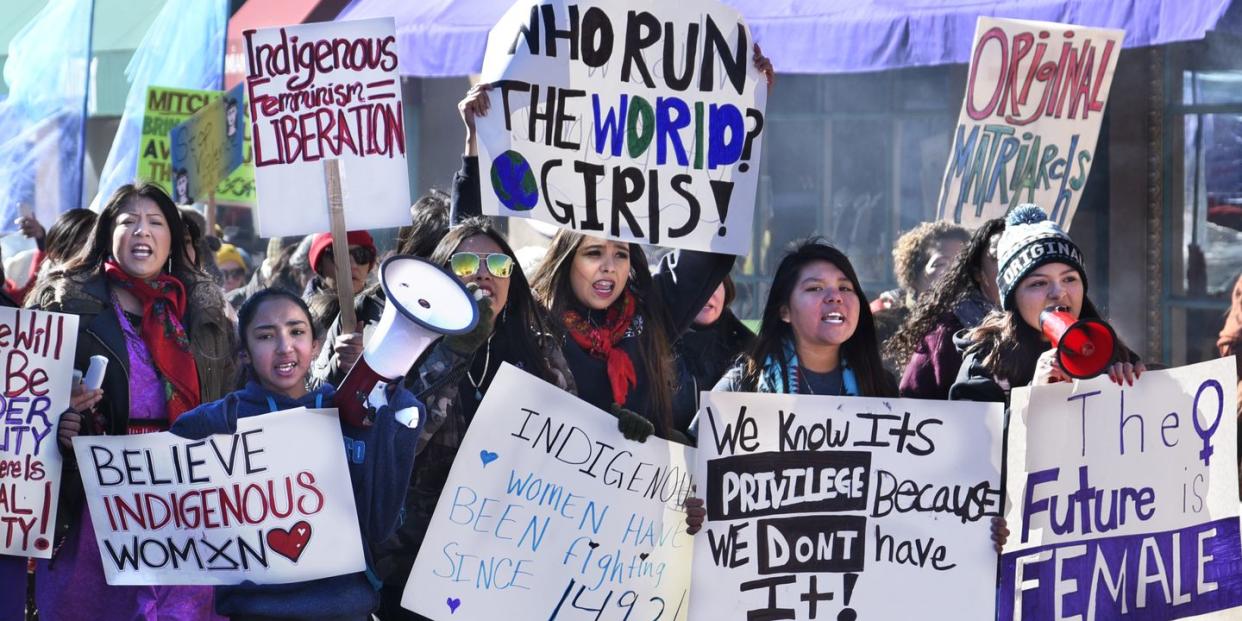Ways to Give Back to Indigenous People Beyond Thanksgiving

Thanksgiving may be a celebration for many, but for Indigenous People, it's a day rooted in extreme loss and false mythology.
Sean Sherman, author of The Sioux Chef’s Indigenous Kitchen, wrote for TIME, "Many of my indigenous brothers and sisters refuse to celebrate Thanksgiving, protesting the whitewashing of the horrors our ancestors went through." And as noted by wbur, Thanksgiving was declared a National Day of Mourning by the United American Indians of New England in 1970, an important moment intended to rectify the false history taught in schools.
Here are some of the ways you can give back to Indigenous and Native People during Thanksgiving time and year-round.
Educate yourself and others on the real history of Thanksgiving.
The first Thanksgiving is generally acknowledged to have taken place in November 1621, after a group of colonists from Plymouth, England, had their first successful harvest, with help from Native Americans. The event is often presented as a jovial affair, with the "settlers" brokering good relationships with the Indigenous People they've learned from. However, as reported by The New York Times, "the story of the first Thanksgiving, as most Americans have been taught it—the Pilgrims and Native Americans gathering together, the famous feast, the turkey—is not exactly accurate."
The taught history of Thanksgiving "paints a deceptively sunny portrait of relations between the Pilgrims and the Wampanoag people," per History.com, and conveniently leaves out the truth, which involved much suffering, disease, and bloodshed. In truth, per HuffPost, Thanksgiving "serves as a reminder of how a gift of generosity was rewarded by theft of land and seed corn, extermination of many Native people from disease, and near total elimination of many more from forced assimilation and as a reminder of 500 years of betrayal."
Indigenous activists like Diné Aesthetics strive to set the record straight on the devastating impact colonization has had on Native Americans, and generously provide resources to aid better representation and understanding moving forward.
Research the land you live on.
By using Native Land Digital's map, you can research the original inhabitants of the place you live, before colonizers claimed the land as their own from Indigenous People. Researching, honoring, and respecting the first inhabitants of a place is a step toward acknowledging the dangers and impact of colonialism and racism.
Decolonize Thanksgiving dinner.
While decolonizing Thanksgiving dinner will be different for everybody, it's an important step in recognizing the origins of the event. In an interview with Vice, Nephi Craig, a member of the White Mountain Apache tribe of Whiteriver, Arizona, explained, "The first step is to be able to identify which foods are indigenous to the Americas. Then, identify which foods are indigenous to the region you live in. ... It comes down to responsibly sourcing your food based on your views on decolonization and food security. It is very complex." Ordering from Indigenous food suppliers is a good start.
Highlight Indigenous voices.
Indigenous People and Native Americans are misrepresented or underrepresented in popular culture and society in general. Resources are available that highlight and lift up Indigenous voices, which is crucial for change. Per The Cut, the Reclaiming Native Truth project "aims to dispel the myths and misconceptions about Indigenous Americans in the dominant narratives of our culture."
Instagram accounts including @_illuminatives are led by Native People in order to highlight the work of Indigenous People, whether it's art, writing, film, or celebrating other industries. For instance, IllumiNative highlighted CBC's Trickster, which is about an Indigenous teenager who meets a mysterious stranger, and Chambers on Netflix, which focuses on a young woman who, following a heart transplant, starts having visions about the organ donar.
Support charities and small businesses.
There are a plethora of organizations and charities you can support, such as the Coalition to Stop Violence Against Native Women and the First Nations Development Institute. View lists of resources here and here.
And as people flock to Black Friday sales and Christmas shopping outlets, it's a great opportunity to support Indigenous small businesses. The Denizen Co. points to an impressive selection of Native-owned brands, including Bedré Fine Chocolate, She Native, Trickster Company, Beyond Buckskin Boutique, B.Yellowtail, Ataumbi Metals, and 8th Generation.
You Might Also Like


